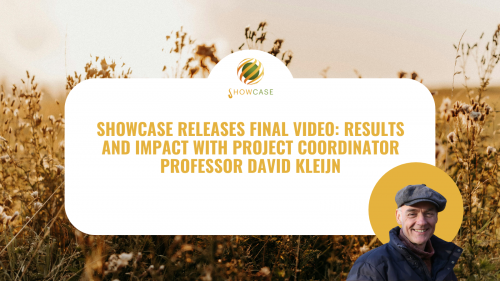SHOWCASE has released its final video, featuring an in-depth interview with project coordinator Professor David Kleijn from Wageningen University. The video highlights the project’s key findings and its impact on research, farmers and biodiversity-friendly farming across Europe.
Confirming the benefits of biodiversity on farms
Professor Kleijn explains that SHOWCASE has demonstrated clear benefits from enhancing farmland biodiversity, including increased species diversity, improved ecosystem services and positive effects such as carbon sequestration and reduced nitrogen seepage. These ecosystem services are largely public goods, which are beneficial for society, but they do not always provide direct economic returns for individual farmers.
This finding underscores the importance of biodiversity-based business models, where farmers are supported financially or through incentives to adopt biodiversity-friendly practices. Without such support, investing in biodiversity often does not make economic sense for farmers, despite the broader societal benefits.
Experimental Biodiversity Areas: practical insights
SHOWCASE set up Experimental Biodiversity Areas (EBAs) to test on-farm measures. Professor Kleijn highlights that planting wildflowers along field margins, for example, increased pollinator abundance and overall biodiversity. However, these practices come with costs, meaning that societal support or incentives are needed to make them feasible for farmers.
Citizen science and public engagement
While directly involving farmers in citizen science proved challenging, volunteers contributed significantly to biodiversity monitoring. The project’s findings also suggest that such initiatives enhance farmers’ appreciation for biodiversity, promoting more informed and engaged stewardship of agricultural landscapes.
A reality check and path forward
SHOWCASE has provided a “reality check” for researchers, showing that while biodiversity offers clear ecological and societal benefits, its adoption by farmers is heavily influenced by economic realities. The intensive collaboration between ecologists and economists within SHOWCASE has been key to identifying solutions that can make biodiversity-friendly farming both viable and attractive, including potential market premiums for products produced in a biodiversity-conscious way.
Watch the full video:
